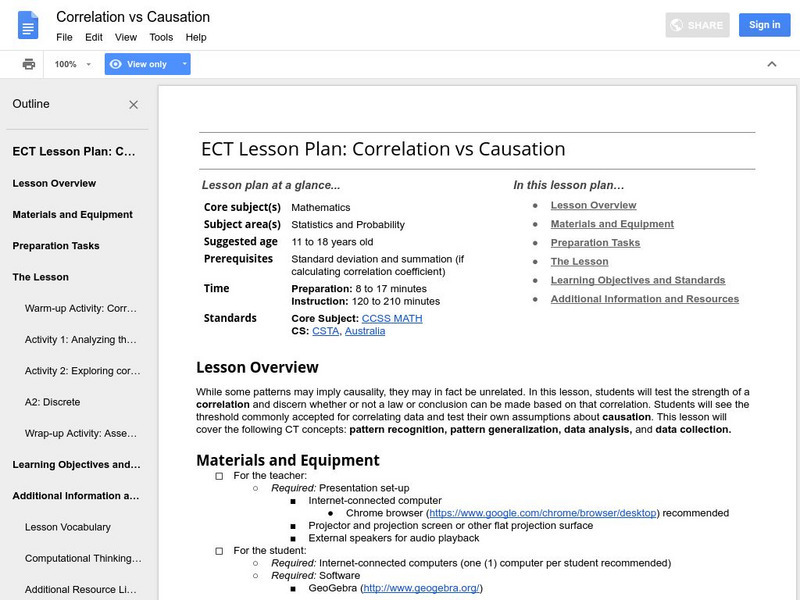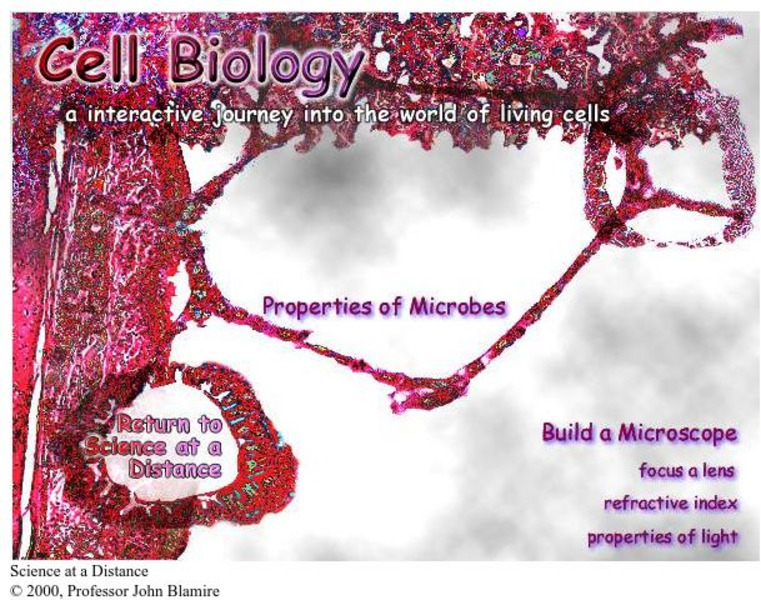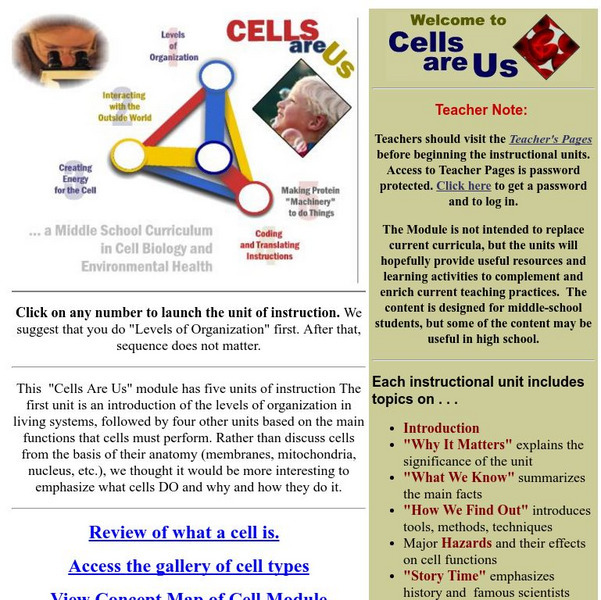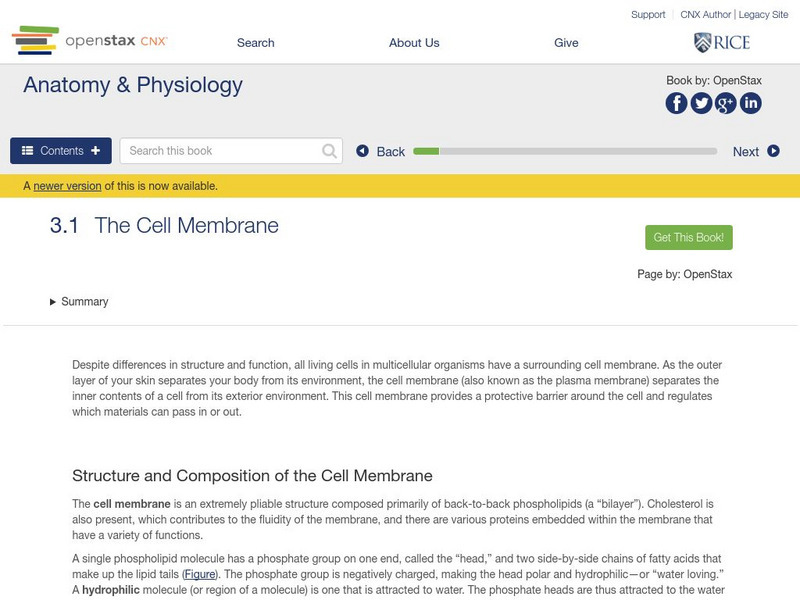Vision Learning
Visionlearning: Cell Biology: Passive and Active Transporters
Explanation of cell membranes and the way selective materials may move through them.
Texas Instruments
Texas Instruments: Cell Structure/function
This StudyCards stack enables students to review information about the organelles of eukaryotic plant cell. They are tested on their ability to describe the structure, location, and function of different cell organelles.
Google
Google for Education: Cell Biology: Filter Design and Construction
Young scholars participate in a simulation which shows the movement of molecules across a cell membrane so that they understand passive and active cell transport. Students also use computational thinking skills by developing systems...
Utah Education Network
Uen: Cell Structures Wee Beasties
In this activity you observe photographs of cells and then make comparisons of the animal and plant cells.
City University of New York
Cell Biology: An Interactive Journey
This interactive website about microscopes and microbes provides students with an introduction to cellular biology.
BioEd Online
Bio Ed Online: The Science of Microbes: Magnifying and Observing Cells
For this activity, students create slides of plant cells and observe them under a microscope. The lesson and PowerPoint slides can be downloaded. The included instructional video on cell observation is 20 min. 44 sec.
Texas Instruments
Texas Instruments: Cell Vocabulary
This StudyCards stack enables students to review the vocabulary associated with cell biology.
CK-12 Foundation
Ck 12: Common Parts of the Cell 1
[Free Registration/Login may be required to access all resource tools.] Online activity summarizes the cell theory, describes four parts all cells have in common, and the importance of the work of Robert Hooke and Anton van Leeuwenhoek.
Georgia Department of Education
Ga Virtual Learning: Anatomy and Physiology: Cells
In this module, students discover how each cell is organized to complete the function of producing and transporting proteins, and how cells relate to homeostasis of the body.
National Institutes of Health
Ncbi: The Molecular Biology of the Cell: The Chemical Components of a Cell
Advanced chapter of the book "The Molecular Biology of the Cell" describes and provides illustrations of our most current understanding of the chemical makeup of cells and their components. Explains in detail how electron activity keeps...
University of Washington
Genome Sciences Education Outreach: Amazing Cells [Pdf]
Multi-activity learning module in which students engage in learning about plant and animal cells through the use of microscopes.
My Science Site
My Science Site: Cell Center Activities [Pdf]
Site provides six possible center activities for teachers to use to engage students in the study of cells.
Other
Eureka Science: Cells: Bacterial Cells
In story form, this site examines the similarities and differences among bacteria, plant cells, and animal cells. Drawings supplement the text for clarity purposes.
Texas A&M University
Peer Curricula: Cells Are Us
Find five instructional units on cells: levels of organization, interacting with the outside world, creating energy for the cell, coding and translating instructions, and making protein "machinery" to do things. Each unit is broken down...
TeachEngineering
Teach Engineering: Active and Passive Transport: Red Rover Send Particles Over
Students compare and contrast passive and active transport by playing a game to model this phenomenon. Movement through cell membranes is also modeled, as well as the structure and movement typical of the fluid mosaic model of the cell...
OpenStax
Open Stax: The Cell Membrane
Learn here about the structure and function of the cell membrane.
Texas Instruments
Texas Instruments: Giant Cells
In this activity you will examine surface area and volume of cells and will describe the relationship between surface area and volume of cells.
Utah State Office of Education
Utah Science: Introducing Cells!
Get to know cells, what they create, how to identify them, and how to tell whether they belong to a plant or an animal. Several activities
University of Arizona
Cell Biology: Online Onion Root Tips
Online mitosis activity offers the student the opportunity to identify, classify, calculate, and graph the phases of mitosis. Explanations of each phase, actual cells are displayed for classifying and gathering data in this comprehensive...
Science Education Resource Center at Carleton College
Serc: Observing Cell Division
In this activity, middle schoolers make microscopic observations of onion root tips, discuss them with classmates, then make detailed drawings that are shared.
University of Arizona
The Biology Project: Cell Membrane Tutorial
Great overview of cell membranes. The site presents the information as a tutorial with multiple choice questions to guide the learner. Very well designed site on cell membranes.
Exploratorium
Exploratorium: Microscope Imaging Station: Classroom Explorations
These microscope activities provide students with lots to explore. Activities include the characteristics of living things, math in science, cell biology, genetics, physiology, and mitosis.
Science Education Resource Center at Carleton College
Serc: Comparing the Simple Structure of Plant and Animal Cells
Students use guided scientific observation using a collection of models, visual material, and microscope slides to identify cell organelles. Then they demonstrate their understanding of the parts/characteristics of cells by identifying...
Texas Instruments
Texas Instruments: General Cell Questions
This StudyCards stack enables students to review general concepts regarding cells.






















